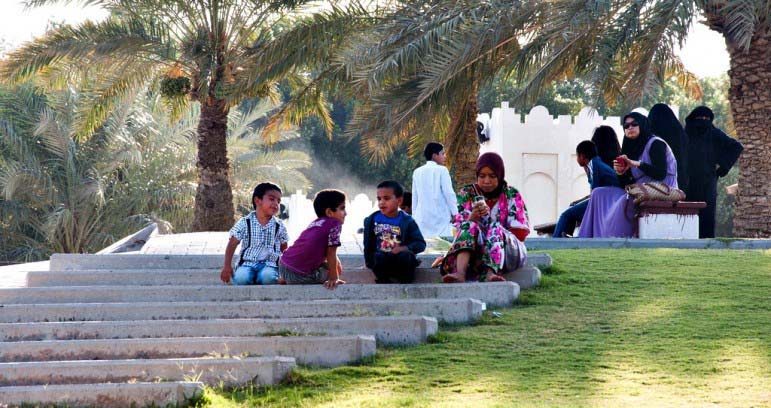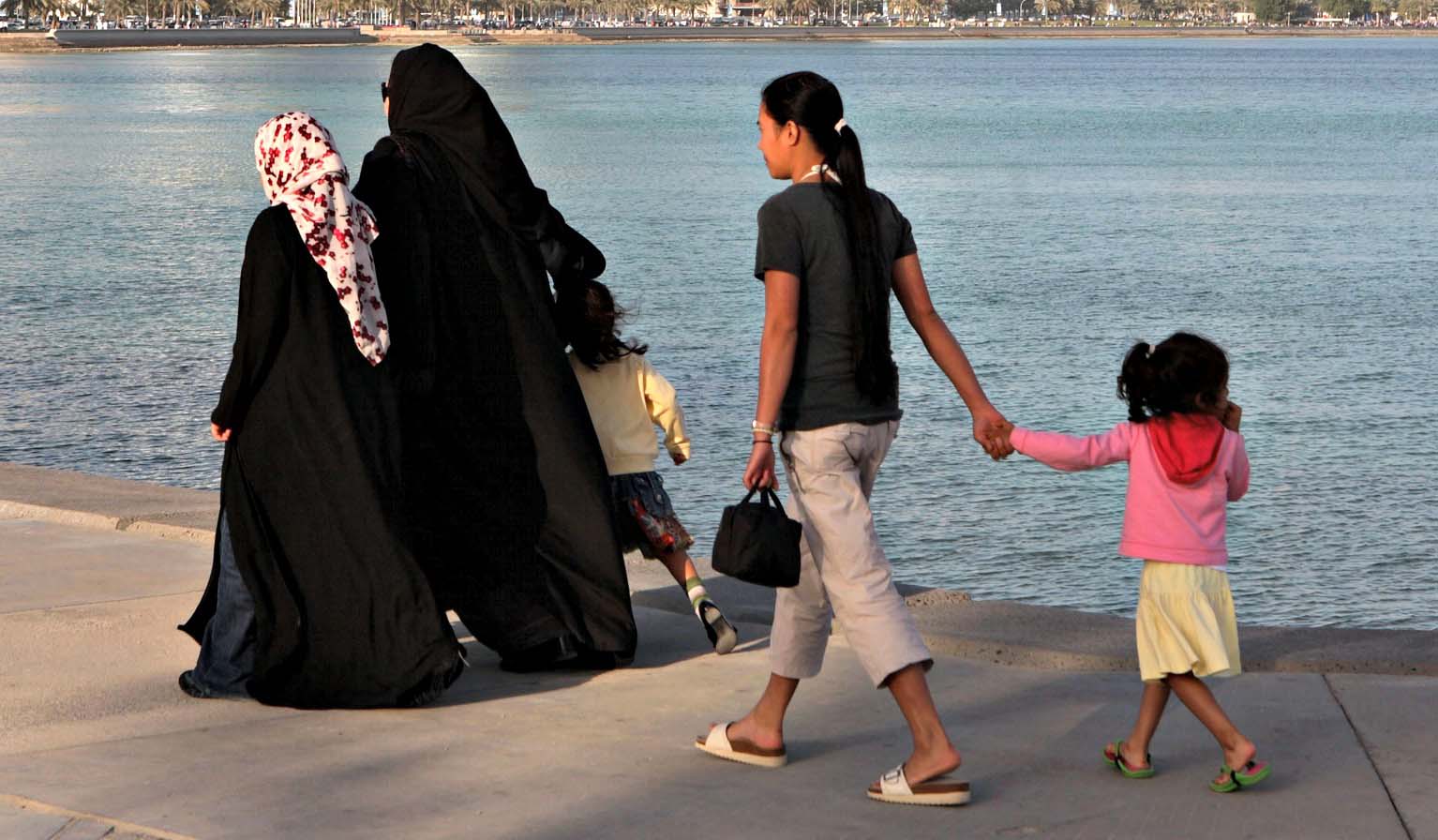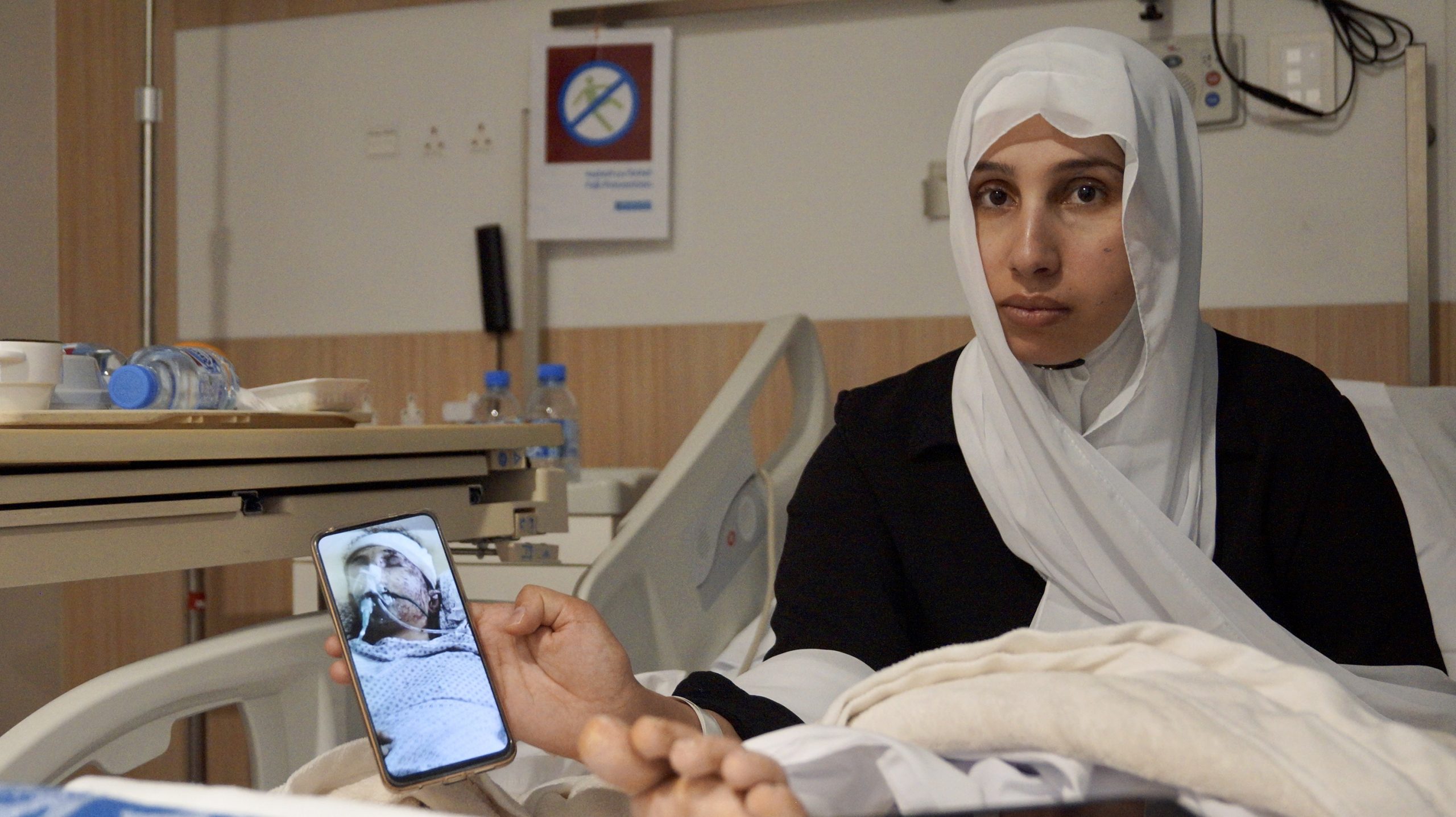
With reporting from Riham Sheble
The system governing domestic workers in Qatar is broken beyond repair and should be revamped to ensure these women’s rights are protected, a new 63-page report from Amnesty International asserts.
Titled “My sleep is my break: Exploitation of migrant domestic workers in Qatar,” the report is the most recent and comprehensive look on the subject. It presents a grim view of how maids, nannies and other women employed as domestic help here are treated.
Rights groups have expressed concern about domestic worker abuse in Qatar for years. Though the Gulf state, which is hosting the 2022 World Cup, is under increasing scrutiny for construction workers’ rights, the plight of maids is a more difficult conversation, Amnesty researcher James Lynch told Doha News. He said:
“As in so many countries, when domestic workers face abuses it often goes unnoticed by the outside world. There are lots of reasons for this but perhaps most obviously, most abuse takes place behind closed doors, making it harder for domestic workers to speak to outsiders, either to seek assistance or simply to explain their experiences.”
Amnesty’s latest report contains appalling accounts of psychological, physical and sometimes sexual abuse of domestic workers based in Qatar, at the hands of both local and expat sponsors.
Though only 52 women were personally interviewed by Amnesty representatives, the group said that its findings were supported by those of many other entities based here and abroad, including rights organizations and embassies.
Typically from poor countries, domestic workers in Qatar are a particularly vulnerable group. The women are subject to kafala rules, but are not protected under the country’s labor law. Thus, options to seek legal recourse against their employers are limited. According to Amnesty:
“The result is that domestic workers are particularly exposed to exploitation and other abuse from their sponsors, as there are few checks against the power of the employer beyond the criminal justice system.”
Substitute contracts
Citing the 2010 Qatar census, the latest figures available, the report states that some 84,000 women in Qatar are employed as domestic helpers. The vast majority of these workers hail from the Philippines (30,000 women) and Indonesia (20,000 women).
Women are also hired from Sri Lanka, Nepal, India and increasingly, east Africa and eastern Europe.
The problem for many of these workers begins at home, when they sign contracts detailing a reasonable set of job expectations and wages (typically $350 or $400/month).
That contract is then often replaced with less favorable terms such as lower wages and longer working hours when the worker arrives in Qatar and is greeted by the recruitment agency at the airport, the report said. Many times, the contract is in Arabic so the worker cannot understand it.

The deception has had far-reaching implication for many women employed in Qatar as domestic helpers. In 2012, health officials said they treated a rising number of maids at Hamad Medical Corp.’s psychiatry department, who were sent there to learn coping skills for anxiety, depression and anger – in part due to being misled about their job duties.
Qatar’s Ministry of Labour and Social Affairs told Amnesty it is working to tackle contract substitution with a new website that allows employees here to choose their employers from online applications. Officials said:
“This project will ensure there will no longer be any discrepancy between the job the worker has signed up for in his country from that signed in Qatar, as all the documents listed on the information base, including the work offer by the employer, will be registered. In the case of any disagreement between the two sides in the future the information can be checked and verified.”
However, Amnesty said it is not clear whether domestic workers would be included as a category on the website.
Over the past few years, Qatar has also increased scrutiny of manpower agencies and begun grading them for their services. But the criteria appears to be oriented more toward the sponsors of domestic help, rather than the women themselves. The report states:
“It should be possible for potential migrant domestic workers and employers to assess a recruitment agency for its adherence to labour rights standards, as distinct from other criteria such as efficiency of services provided to employers.”
It also recommended that Qatar extend its new policy of blacklisting companies that abuse migrant workers to include those who abuse domestic help, so that they cannot hire more such employees in the future.
Abuse
Once domestic workers arrive in Qatar, they are largely at the mercy of their sponsors in terms of working hours, recreational options and even food.
Though some women interviewed by Amnesty said their employers were “kind,” others worked in harsh conditions under abusive sponsors. Due to a lack of regulation, these workers did not have many avenues to seek recourse for this treatment, the report said.
Types of abuse included:
- Long working hours. Fourteen women interviewed by Amnesty said they worked at least 15 hours a day, seven days a week, amounting to average working weeks of more than 100 hours. A UN report last year found that domestic employees in Qatar work more than 60 hours a week – longer than those in any other job in the country.
- Violence. A dozen women told Amnesty that some form of violence was used against them by their employers as a way to discipline them. Punishments included slapping in the face; pulling hair; poking in the eyes; pushing; kicking down the stairs; throwing hot oil; kicking in the stomach; holding hot objects against the skin; and pinching or scratching of the skin.
- Non-payment/wage deductions. This method was used by many sponsors to ensure that workers remain in their jobs. According to Amnesty, employers “can exploit the isolation faced by domestic workers, which makes it more difficult for them to complain to the authorities or stop working, and non-payment can therefore often continue for very long periods.”
- Passport confiscation. Almost all of the women interviewed by Amnesty said that recruitment agents gave their passports to their sponsors, and they never saw them again.
- Restrictions on movement. Several women told Amnesty they were only allowed to leave the house when accompanied by their employer or employer’s relative. Others said they were locked in the house when their sponsors left. This is concerning because “there is no way of them getting outside of the house to get help,” one social worker who assists distressed Filipino workers told Amnesty. In some cases, cell phones were confiscated, and many times, women were turned down when asked if they could go to church.
- Verbal abuse. Some workers said they faced a barrage of insults from their sponsors, who call them “prostitutes,” “stupid,” “not clean,” “animal,” and other derogatory words. Amnesty highlights media coverage of maids in this segment of the report, citing articles from Arabic dailies that stigmatize these women as thieves, witches and “a threat to the future of society.”
When they run
Faced with abuse, some women make the hard decision to leave their employers, but still find little relief.
Amnesty recounts the tale of Maria, a 24-year-old Filipina maid whose employer never paid her, was not allowed to have a mobile phone, had no days off, and was once given moldy cheese to eat. When her female sponsor began physically abusing her, she decided to leave by simply walking out the door.
According to the report:
Maria said she walked alone for hours, still dressed in her uniform.
“I saw a guard, and he said, ‘where is your ID?’ I said sorry. I went to the mall, and saw a guard there, and asked for a taxi. He asked why I needed a taxi. He asked if I had a problem; I said no. I saw a Filipina, and I said, ‘please help me.’ She said, ‘sorry, I’m busy.’
I went back to the mall to get a taxi. I said ‘sir, please send me to the airport’. [The driver] asked me why I was going to the airport. I said I was going on vacation.”
Maria eventually ended up at a deportation center, a common fate for many absconding female workers. According to Amnesty, 95 percent of the women detained in a center the group visited last year were former domestic helpers.
The report added that the UN Special Rapporteur on the human rights of migrants found last November that most women being held there had left their employers due to poor working conditions. He encouraged authorities to stop punishing domestic workers for being abused.
At the time, François Crépeau said: “Accommodating such women in open shelters, instead of building a new ward for women at the deportation centre, would provide a much better and cheaper solution.”
Prison
Domestic workers also comprise the majority of women in Qatar’s jails, according to Amnesty’s report. About half of those in jail were held on charges of having sex outside of marriage, or for theft.
Due to a fear of being charged with having “illicit relations,” many women who are sexually abused in Qatar avoid reporting the crime. Additionally, Amnesty states that:
“Domestic workers may not immediately report rape or sexual abuse to the authorities, (because of) post-traumatic shock, feelings of shame, fear of the repercussions of making a report, lack of information about how to make a report or physical confinement in the home.”
In line with the UN’s position on extramarital affairs, Amnesty urged Qatar to repeal the criminalization of consensual sex between adults. It said the current rules have a “chilling effect” on the willingness of women to report sexual violence or rape.
The report also highlighted one effect of charging people with “love crimes,” saying that researchers observed 13 children between the ages of one month and two years old with their mothers during a prison visit last March. Five pregnant women were also detained at this time.
Speaking to Doha News last year, one former domestic worker explained her ordeal after getting pregnant and having a baby out of wedlock in Qatar.
Government response
In a letter to Amnesty, Qatar’s Ministry of Labour and Social Affairs acknowledged that house help does not fall under the labor law, but there are articles in this law and others that protect all residents from things like abuse, passport confiscation and human trafficking.
However, it did not address concerns about how domestic workers can avail themselves of these laws, when they are often locked up inside of sponsors’ homes and unaware of their rights.
The ministry also mentioned that a draft law is in the works to detail domestic workers’ rights. This legislation has been talked about for years, but has stalled recently across the Gulf because of a provision that would allow women to have one day off a week.
Finally, the ministry said the government has been working to raise awareness among domestic helpers about their rights. For example, it said the Qatar Foundation for Combating Human Trafficking liaises with the Filipino embassy here to help distressed women get assistance.
Recommendations
To improve labor conditions for domestic workers, Amnesty made several recommendations, including that Qatar:
- Amend the labor law to include domestic workers so that they are afforded equal legal protection;
- Lift kafala restrictions that require sponsors’ approval for employees to switch jobs or leave the country;
- Amend the labor law to allow all migrant workers, including domestic help, to form or join trade unions;
- Scrutinize recruitment companies for compliance to international human rights standards, and cancel the licenses of violators;
- Improve awareness among domestic workers and officials on how to report a human trafficking crime and prosecute it;
- Decriminalize “absconding” and explore alternatives to detention;
- Make it easier for workers to report abuse by allowing them to return to their home countries during court cases or work for a new sponsor as the case goes through the system; and
- Train police officers to assist and identify victims of domestic violence, which should be criminalized under the law.
Countries of origin were also urged to enforce the regulation of recruitment companies, shore up training and orientation of workers headed to the GCC, increase support to diplomatic missions in Qatar to help those facing abuse and offer a complaint mechanism for those in need of help.
And on an individual level, there’s also many things a sponsor of a domestic worker could do to ensure her basic rights, Lynch told Doha News:
“First and foremost, we expect that people who employ domestic workers in their home think hard about what they are pro-actively doing to ensure their employee’s rights are respected.
That should include making sure for themselves that the person they recruit from overseas fully understands the terms and conditions outlined in their contract, and offering their employees decent wages and working hours, with time off every week, as well as a proper space to live in. They should also demand high standards of their recruitment agents and find out what systems they have in place to ensure domestic workers’ rights are respected.”
Here’s the full report:
Thoughts?







